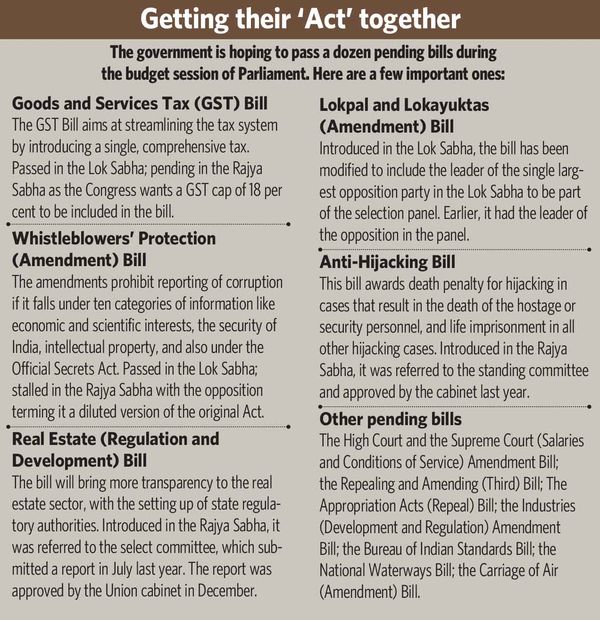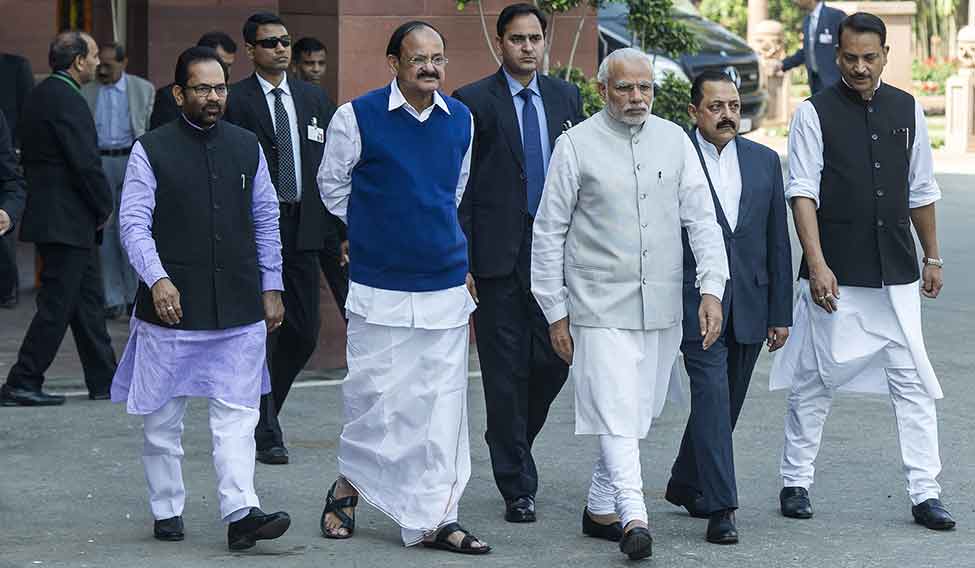On a sultry forenoon last July, Rajya Sabha chairman Hamid Ansari adjourned the house for the umpteenth time as a noisy opposition disrupted the proceedings to highlight the Vyapam and Lalit Modi scams. Then it happened. Prime Minister Narendra Modi made a rare appearance in the Rajya Sabha. He walked across to the opposition benches, grabbed the arms of former prime minister Manmohan Singh and exchanged pleasantries with senior leaders.
Those three minutes, said opposition leaders, was the first time that Modi personally reached out to them. The next time it happened was during the winter session of Parliament, when Modi invited Manmohan Singh and Congress president Sonia Gandhi to tea, in an attempt to bridge the differences on the Goods and Services Tax bill. But as Manmohan Singh recalled recently, even in that meeting, it was Finance Minister Arun Jaitley who did all the talking.
And then it happened once again on February 16, a week before the start of another Parliament session. Modi called opposition leaders, ostensibly to seek their cooperation in the budget session and to see if he could get some of the crucial bills passed in the Rajya Sabha.
Keen to know what was on Modi’s mind, opposition leaders agreed to the meeting and even praised his initiative to engage them. But, in the end, they were disappointed. Modi did listen to them patiently, but he did not have a word to tell them, except a vague assurance that he would "respond to the issues raised by the opposition," and expressing the hope that "the congenial mood here will be translated into action in Parliament."
The government’s legislative agenda is getting stuck in the Rajya Sabha, where the National Democratic Alliance is in a minority, and the opposition is in no mood to oblige. The NDA has 63 of 245 members in the Rajya Sabha, while the United Progressive Alliance has 88 and the arithmetic is unlikely to change in the next two years. The upper house transacted little business in the last two sessions, and crucial bills, including the GST bill, were pushed off the track. Disruptions became the norm, and scenes of MPs rushing into the well of the house were common. The opposition has used its numerical strength to force the government to refer bills to parliamentary committees. For Modi, therefore, the Rajya Sabha has become the crucial house, as the numbers are not on his side.
With Modi promising nothing more than platitudes, the ongoing budget session has opened on a tumultuous note. Setting the tone, Sonia Gandhi told her party's working committee: "The ruling establishment seems to have lost all sense of balance and proportion. To cover up its many failures, the ruling establishment has once again unleashed its divisive agenda by generating a wholly unwarranted debate on patriotism and nationalism." The opposition feels the government does not desire calm in Parliament. "The BJP sets the agenda beforehand so that the house cannot function," said CPI(M) general secretary Sitaram Yechury, a member of the Rajya Sabha. "Before every session, they create such an atmosphere that it has an impact on Parliament."
The opposition is at a loss to understand why the prime minister does not respond to the issues that agitate them. Said CPI leader D. Raja, who was asked by a BJP leader to shoot his daughter for taking part in the agitation at Jawaharlal Nehru University: "The PM is yet to utter a word on the JNU issue. It was raised at the all-party meeting and we said he should intervene."

The opposition is particularly miffed by the vicious statements made by members of the BJP, including some of its MPs and MLAs. Following the National Herald issue, certain BJP leaders alleged that Congress vice president Rahul Gandhi had British nationality. BJP president Amit Shah questioned Rahul's nationalistic credentials in the backdrop of the JNU row, asking whether he wanted another partition. Modi himself launched a strident attack on the opposition, alleging that they, along with foreign-funded NGOs, were destabilising the government. "What is happening on the streets has an effect on what happens in Parliament. If there is too much heat outside, it is bound to affect the goings on in Parliament," said Abhay Kumar Dubey, associate professor at the Centre for the Study of Developing Societies, Delhi. Meanwhile, in the opposition, even bitter rivals like the CPI(M) and the Trinamool Congress are coming together to fight the BJP government. "Often, Derek O'Brien (of the Trinamool) and Sitaram Yechury interact on issues that are being raised by the opposition," said a Congress leader.
This time, the government has shortlisted 32 legislative items for the budget session, including 11 bills that are pending in the Rajya Sabha and one in the Lok Sabha. However, there is no guarantee from the Congress on the passage of bills in the Rajya Sabha. "We will definitely help to pass the bills, based on their merit," said Ghulam Nabi Azad, the leader of opposition in the Rajya Sabha. "A lot of incidents have taken place in JNU and then in court, and also in Hyderabad University. If proper discussions are held, then we will help."
The government is not backing down. The BJP leadership has reached the conclusion that there is no need to be defensive on the action taken in the JNU case. It is felt that it only strengthens their claims to nationalism, as they have acted against students who raised “anti-national” slogans. It feels that those who lost in the Lok Sabha elections are misusing their strength in the Rajya Sabha to obstruct the government's development agenda.
The opposition's argument is that it is the duty of the government to create consensus, and that you cannot expect a civilised debate in Parliament if there is no real consensus outside. "The NDA has a majority in the Lok Sabha and it wants to clear bills in the Rajya Sabha the way it has conducted business in the lower house. That is not the right attitude," said Samajwadi Party leader Naresh Aggarwal.
The government, however, said efforts were made to address the concerns of all the parties. "The prime minister has adequately and eloquently responded to all the issues raised by the opposition in Parliament," said Parliamentary Affairs Minister M. Venkaiah Naidu.
Caught between these claims is a visibly disappointed Ansari. Disruptions "reflect adversely on the parliamentary process and our commitment to it. There is an imperative need to dispel this impression," he said at the conclusion of the winter session. When it was suggested that he should take disciplinary action against the truant, Ansari said normal disciplinary procedures had their limitations, calling for self-discipline by the members.
Even some of the regional parties that do not agree with the disruptive tactics of the Congress do not want the government to rush through its legislative agenda. "The government is in a hurry to do certain things, which is not the practice in a parliamentary democracy," said Bhartruhari Mahtab of the Biju Janata Dal. "The party in power, if it does not have the numbers in the Rajya Sabha, should wait, instead of rushing through decisions."
There is also a lurking fear that the government, frustrated by the slow legislative processes, would resort to executive shortcuts, including ordinances or a joint session of Parliament. "The Modi government is seeking to bypass the Rajya Sabha and steamroll its legislative proposals through the 'tyranny of majority’ that it demonstrates in the Lok Sabha," said Yechury.
Meanwhile, constitutional pundits talk about how Parliament now functions purely on party lines. "There is a special culture of opposition in our country. Normally, in the parliamentary system, the opposition is part of the government in the wider sense of the term," said constitutional expert Subhash Kashyap. But over the years, the opposition has taken a very adversarial position, which is affecting the functioning of Parliament. "Even after the elections, the adversarial position continues, which is not in parliamentary culture. All parties are to be blamed for this."






